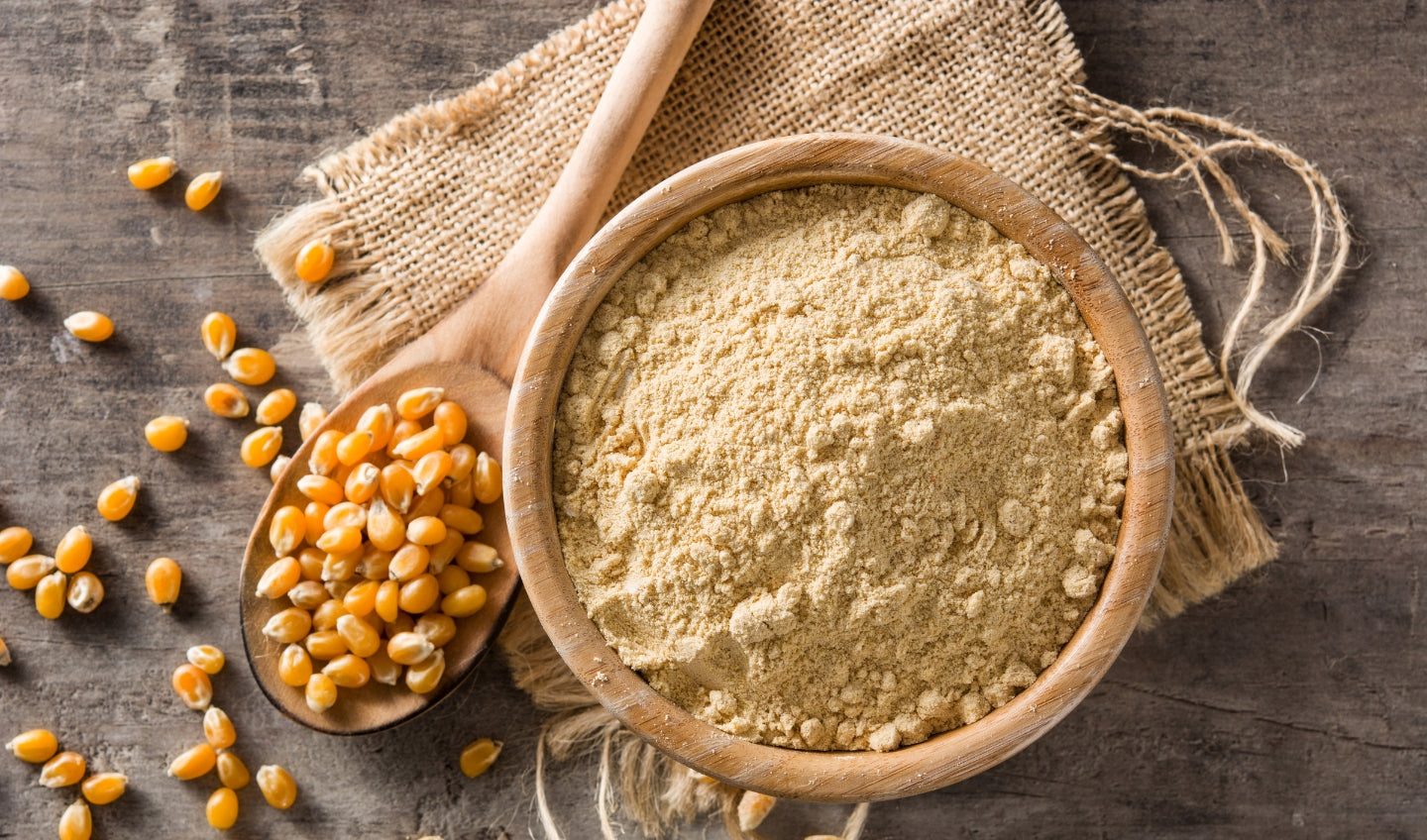If the list of ingredients on baby formula packaging sometimes looks like a foreign language to you, you're not the only one; we understand your confusion. Corn maltodextrin is among those ingredients you may not be familiar with.
Today, we will clear up what maltodextrin is and address the common questions and concerns about this infant formula ingredient. We will also cover corn maltodextrin's role in formula and its main benefits and drawbacks to help you pick the best formula for your baby. So, let's get started!
Contents
- What is Corn Maltodextrin, and Why is it in Baby Formula?
- Is Corn Maltodextrin the Same as Corn Syrup?
- Nutritional Aspects of Corn Maltodextrin in Formula
- Benefits of Corn Maltodextrin in Baby Formula
- Potential Downsides of Corn Maltodextrin in Infant Formula
- Alternatives to Corn Maltodextrin in Baby Formulas
- Choosing the Right Baby Formula: Considering Corn Maltodextrin
- Discover Premium European Infant Formulas at Baby Milk Bar
What is Corn Maltodextrin, and Why is it in Baby Formula?
So, let's begin with the central questions: what is corn maltodextrin, and what business does it have in your baby's formula?
Maltodextrin is a plant-based processed carbohydrate. It is produced using hydrolysis, which involves adding water to corn, potato starch, or wheat.
Generally, corn maltodextrin is used as a gluten-free food additive that acts as a thickener. In other words, it's used as a little trick to increase the volume of processed foods.
It can also be used as a preservative. That being said, maltodextrin has more versatile uses in infant formula than when it's used in some other foods.

This ingredient serves multiple purposes in formula. It not only thickens the formula but also adds texture and helps prolong its shelf-life. Additionally, it can be used as a replacement for lactose in lactose-free or lactose-reduced formulas, which are suitable for babies with lactose intolerance or sensitivities.
Interestingly, it's also believed that using corn maltodextrin in infant formula may help reduce intestinal distress. However, it's important to note that further studies are needed to confirm this finding.
It is safe for babies to consume maltodextrin but more research is needed to fully understand the long-term consequences of replacing lactose with maltodextrin.
Is Corn Maltodextrin the Same as Corn Syrup?
Even though maltodextrins are related to corn syrup solids (they are both carbohydrates), they aren't the same thing. Corn maltodextrin has very little to zero sugar. In other words, it has a more neutral flavor, unlike the very sweet corn syrup.
Nutritional Aspects of Corn Maltodextrin in Formula
Now that you understand what this ingredient is, you may want to know whymanufacturers add maltodextrin to infant formulas. Allow us to explain!
As we've already mentioned, maltodextrin is a class of carbohydrates. And carbs are made of simple sugars (for example, fructose which is fruit sugar, or lactose which is milk sugar).
Carbohydrates act as a source of energy for your little one and are essential to your baby's development and growth.They also work to support the body's basic metabolic processes.
Maltodextrins have a calorific value of 4 kcal/g. They are easily digested and are absorbed rather quickly, thanks to their composition.This makes formulas with maltodextrin a gentler alternative for babies with lactose intolerance.
Benefits of Corn Maltodextrin in Baby Formula
You've probably noticed that people are often weary of carbs. After all, why are those low-carb diets still popular?
But carbohydrates aren't always bad, especially when it comes to babies, and maltodextrin can be a good example of that.
Let's take a look at some of the benefits that maltodextrin has when added to infant formula, including:

1. Improved Texture and Consistency
Maltodextrin can give the prepared formula a smooth consistency, making it easier and more enjoyable for your baby to drink.
2. Prolonging Formula Shelf Life
This one is simple: as a preservative, maltodextrin can prolong the life of your baby's formula, allowing you to make fewer trips to the store and keep a steady supply on hand in case of emergencies!
3. Providing Energy for Growth and Development
This ingredient is recognized as a valuable energy source, contributing to babies' growth.
4. Replacing Lactose
For babies requiring lactose-free or lactose-reduced formulas, maltodextrin is a great energy source.
5. Faster Absorption
Corn maltodextrin is readily absorbed, allowing your baby's body to start using maltodextrin quickly.
Potential Downsides of Corn Maltodextrin in Infant Formula
So, here's the deal: just like almost any other ingredient, maltodextrin can have its pitfalls and potential risks. We want to remind you that the FDA approves of it, but any maltodextrin meal can potentially cause side effects. Let's take a peek at some of the possible drawbacks below:

Allergies and Sensitivities
Maltodextrin intake can be a potential concern for those with food sensitivities and inflammatory bowel disease.
The symptoms of maltodextrin allergy may include bloating, gas, cramps, diarrhea, and skin irritation.
You should consult your pediatrician if you suspect your baby is not tolerating maltodextrin.
Increased Blood Sugar Levels
It's important to keep in mind that maltodextrin has an elevated glycemic index compared to some other carbs. Thus, maltodextrin increases blood sugar levels similarly to glucose.
Beyond these established food science findings, studies show that dietary polysaccharide maltodextrincan suppress the body's ability to ward off the salmonella bacteria, which can potentially lead to gastroenteritis. However, this issue requires further studies before a link can be confirmed.
It's worth mentioning that these risks are more often associated with maltodextrin derived from processed foods that people consume frequently. Thus, the danger isn't in this component alone but also in processed foods' sugar, sodium, and fat.
This situation looks different when it comes to infant formula because babies consume digestible maltodextrins in their formula, not junk food.
We understand that these risks can seem scary, but remember that the ingredients in your baby's formula must demonstrate their safety before they can be approved for use.
If you have any concerns, a pediatrician can help determine your baby's sensitivities and choose the best option for your little one!
Alternatives to Corn Maltodextrin in Baby Formulas
If your baby's pediatrician determines your little one is sensitive to maltodextrin (or you would prefer to avoid maltodextrin altogether), there are plenty of formulas out there that omit it!
The most common alternatives to corn maltodextrin include:
• Lactose, also known as milk sugar, is the main carbohydrate found in breast milk and is typically the recommended choice for your baby, unless advised otherwise by their doctor (for example, it's not suitable for babies with lacotse intolerance). Lactose adds a naturally sweet taste to the formula, which many babies enjoy!
• Corn syrup is especially common in soy formula and serves as another source of carbohydrates that are easy to digest. Corn syrup formulas are suited for most babies with food allergies or gastrointestinal issues but may pose other health risks.
• Starch, in its resistant form, naturally resists digestion in the small intestine and is higher in fiber, making it less likely to affect blood sugar levels than maltodextrin. That being said, starchy food may cause tummy pain and diarrhea if your baby's digestive system isn't ready for it. Usually, this ingredient is only added to later stages of baby formula as older babies better tolerate it.
Choosing the Right Baby Formula: Considering Corn Maltodextrin
No doubt, choosing the right formula often becomes a stressful, time-consuming task trying to research and test what will work well for your baby. Maltodextrin has mixed reviews, some babies do very well on it, and others are more sensitive to this ingredient.
The best thing you can do is get expert recommendations from your baby's doctor. They can help you understand your baby's needs and whether your little one has any food sensitivities. A professional can also help you compare formula options and learn more about their ingredients.
If you're looking for a wide assortment of premium baby formulas, you can peruse plenty of options in our store and receive assistance from our attentive customer service team should you need a helping hand!
Discover Premium European Infant Formulas at Baby Milk Bar
Here at Baby Milk Bar, we understand that your little one deserves only the best. That's why we select only high-quality European formulas that have undergone a series of safety tests and use only premium ingredients.
We are also happy to offer various options to ensure a perfect formula match for any baby. We offer EU organic formulas, formulas based on cow and goat's milk, and hypoallergenic and special options.And, of course, we have maltodextrin-free formulas, too!
We are pleased to offer first-time customers a 5% off discount code.So, make the most of your shopping experience and get your premium European formula for an amazing price!
Our Maltodextrin-Free Formulas Are:
Cow formulas 🐄:
-
HiPP Dutch
-
HiPP UK
-
HiPP German PRE (Stage PRE is lactose-only, the rest have starch)
-
Holle PRE
-
Lowenzahn Organics
-
Lebenswert Bio
-
Kendamil Organic/Classic
Goat 🐐:
-
Jovie
-
HiPP Goat PRE
-
Holle Goat PRE
-
Nannycare
Special formulas 👩⚕️:
-
HiPP HA PRE (Stage PRE is lactose-only, the rest have starch)
-
HiPP Anti-Reflux
Our Formulas With Maltodextrin Are:

Cow formulas 🐄:
-
Holle (from stage 2)
Goat 🐐:
-
Holle Goat (except Stage PRE)
-
Holle Goat Dutch
Special formulas 👩⚕️:
-
HiPP Comfort (which also has reduced lactose content)
Wrapping Up: Making an Informed Decision about Baby Formula
Infant formulas don't need to be a complicated science; we hope with our article, you can walk away with the information you need to decide what ingredients are best for your baby.
We would also like to remind you that getting a professional opinion from your pediatrician is crucial. A professional can help you choose the best formula based on your baby's sensitivities and needs.
Finally, we encourage you to browse our selection of top-quality European formulas and reach out to our customer support for personalized advice and recommendations!
We are sure you will find something to keep your baby healthy, safe, and well-nourished!
Breast milk is the best source of nutrition for babies. Before altering your baby's diet or feeding routine, consult your healthcare provider for personalized recommendations. The information in this article is strictly for informational purposes and is not a substitute for medical advice.





